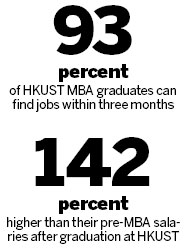-
News >Bizchina
HK becomes key hub for business schools
2011-05-16 13:28Asia's growing economic clout draws global interest from future bosses
BEIJING - When Professor Steve Dekrey moved to Hong Kong 15 years ago to set up the Kellogg-Hong Kong University of Science and Technology (HKUST) executive master of business administration (EMBA) program, he anticipated Asia being the world's new growth center, providing more marketing room for Asia business schools.
The program was named the world's No 1 EMBA project in 2009 and 2010, according to the Financial Times. And HKUST's MBA program ranked No 6 globally in 2010, from ninth in 2009, according to the latest annual FT's MBA rankings released last month.
Five years ago, there were no Asian business schools in the top 20 in the global rankings. Now there are four: HKUST Business School, China Europe International Business School (CEIBS), the Indian School of Business and the Indian Institute of Management.
"Asia is such an important business destination for big and growing companies. An Asian component will be more critical now than 10 years ago. This is where the growth of Asia-related MBA programs is," said Dekrey, senior associate dean of HKUST Business School.Hong Kong is currently developing its position as an educational hub for the region and beyond. HKUST aims to draw in more students from Europe and the United States to strengthen its position internationally and also wants to attract students from the Chinese mainland to cash in on the growing economic engine.
Speakers at HKUST include Wang Shi, chairman of China's real estate company Wanke, and Professor Chan Ka-keung, secretary for financial services and the treasury in the government of the Hong Kong Special Administrative Region.
World Bank Senior Vice-President Justin Yifu Lin and well-known economist David Li Daokui are former professors at HKUST.
Asia is such an important business destination for big and growing companies. An Asian component will be more critical now than 10 years ago. This is where the growth of Asia-related MBA programs is."
PROFESSOR STEVE DEKREY SENIOR ASSOCIATE DEAN, KELLOGG-HONG KONG UNIVERSITY OF SCIENCE AND TECHNOLOGY
China's growing economic muscle is pulling the country's business schools into the big league. The nation's economic rise is shaking up business education all across Asia, not only in China. This is why these Asian business schools are rising in the ranking, said John Quelch, dean at CEIBS.
Yoo Jin-woo, 29, worked as an engineer at IBM in Sydney before entering the HKUST MBA program last summer. Born in South Korea, raised in New Zealand and educated in Australia and Japan, he said he was often tasked to work for Asian clients at IBM.
"This led me to think that I could not and should not cut my links with Asia and this is where I should build my career. And it was obvious that Asia, especially China is growing so fast that a growing number of MBA holders from Western Schools are coming to this region to find jobs. So there are few reasons for me to do an MBA outside Asia," he said.
"HKUST is also rising fast in the global business school rankings from 16th to 6th place over the past two years on the FT list," he said.
A survey by the FT showed that 93 percent of HKUST MBA graduates can find jobs within three months. On the salary side, their salaries three years after graduation are 142 percent higher than their pre-MBA salaries
"We have a mixed background in our student population. We have students from around 20 different economies in any given year. The highest percentage is usually Hong Kong, the Chinese mainland or the United States, at around 20 percent. There has never been a dominant culture in the classroom. We've been finding candidates from the US, London, and Russia because they want to connect to Asia and see a future here. This trend is increasing," said Dekrey.
He also said Asian students are increasingly interested in studying in Hong Kong.

Adam Li, a Shanghai engineer who worked in Singapore before embarking on an MBA program at HKUST, said he chose to study in Hong Kong because he saw the growth of the Chinese economy provided more room in the mainland's job market for top managers.
For some students, transferring their career to the business sector is another key reason.
A TV host in Hong Kongsurnamed Wang would like to become a business executive at an investment bank. She joined the HKUST program last summer because of the number of jobs available in financial sectors in Hong Kong.
